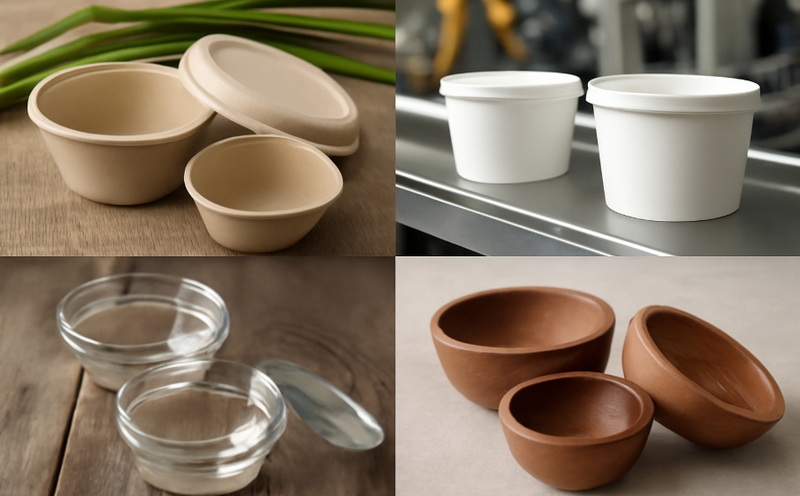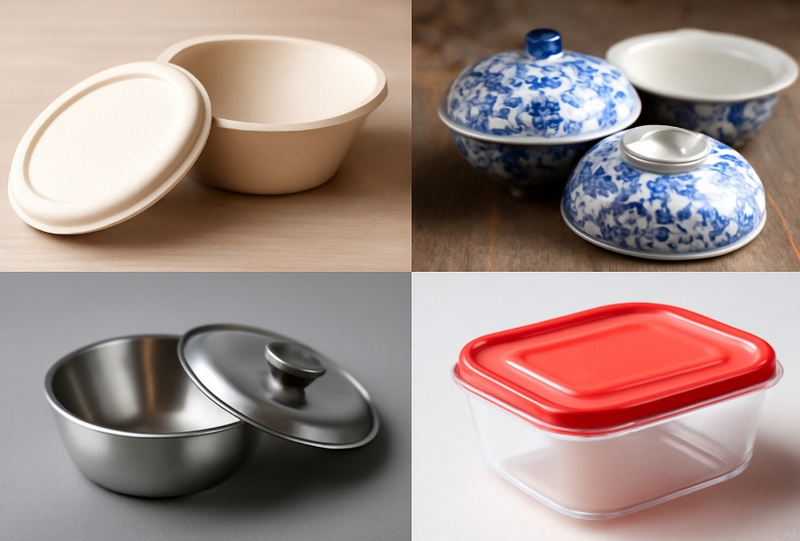
Content Menu
● Understanding Bamboo Pulp Products
>> What Is Bamboo Pulp?
>> The Manufacturing Process
● Health Benefits of Bamboo Pulp Bowl and Lid Sets
>> Chemical-Free and Non-Toxic
>> Hypoallergenic Properties
>> Antibacterial and Antimicrobial Features
>> Temperature Resistance and Food Safety
>> No Residual Odor or Taste
● Environmental Health and Its Connection to Human Well-being
>> Biodegradability and Compostability
>> Sustainable Resource Management
>> Reduced Carbon Footprint
● Comparing Bamboo Pulp Bowls and Lids to Other Materials
● Practical Benefits for Everyday Use
>> Versatility
>> Convenience
>> Aesthetic Appeal
● Addressing Common Concerns
>> Are Bamboo Pulp Products Durable?
>> How Do They Compare in Cost?
>> Can They Be Used for All Types of Food?
● The Broader Impact: Healthier Communities and Planet
>> Reducing Microplastic Pollution
>> Supporting Ethical Production
>> Promoting a Circular Economy
● Conclusion
● FAQ
>> 1. What makes bamboo pulp bowl and lid sets safer for food contact?
>> 2. Are bamboo pulp bowls and lids suitable for hot and cold foods?
>> 3. How should bamboo pulp bowls and lids be disposed of after use?
>> 4. Can bamboo pulp products cause allergic reactions?
>> 5. Are bamboo pulp bowl and lid sets cost-effective in the long run?
As awareness of environmental and health issues grows, consumers and businesses are seeking alternatives to traditional plastic and paper food containers. Among the most promising options are bamboo pulp bowl and lid sets. These products are gaining popularity not only for their sustainability but also for the health benefits they offer. In this comprehensive article, we'll explore what makes bamboo pulp bowl and lid sets a healthier choice, how they compare to other materials, and why they're becoming the go-to solution for eco-conscious individuals and organizations.

Understanding Bamboo Pulp Products
What Is Bamboo Pulp?
Bamboo pulp is a natural material made from the fibers of the bamboo plant. Bamboo is renowned for its rapid growth and minimal need for pesticides or chemical fertilizers, making it an ideal renewable resource. The process of transforming bamboo into pulp involves breaking down the plant's fibers and molding them into various shapes, such as bowls and lids, using heat and pressure.
The Manufacturing Process
The production of bamboo pulp bowls and lids is designed to be as eco-friendly and safe as possible. The process typically includes the following steps:
- Harvesting mature bamboo stalks.
- Breaking down the bamboo into fibers.
- Converting the fibers into pulp.
- Molding the pulp into bowls and lids using heat and pressure.
- Drying and finishing the products to ensure durability and safety.
This process avoids the use of harsh chemicals, resulting in products that are safe for food contact and minimize the risk of chemical leaching.
Health Benefits of Bamboo Pulp Bowl and Lid Sets
Chemical-Free and Non-Toxic
One of the main health benefits of bamboo pulp bowl and lid sets is their chemical-free composition. Unlike many plastic containers, which may contain harmful additives such as BPA or phthalates, bamboo pulp products are typically free from such toxins. This reduces the risk of chemicals migrating into your food, especially when exposed to heat or acidic contents.
Hypoallergenic Properties
Bamboo is naturally hypoallergenic, which means bamboo pulp bowls and lids are less likely to cause allergic reactions. Their smooth, non-porous surfaces also inhibit the accumulation of allergens and bacteria, making them a safer option for people with sensitivities.
Antibacterial and Antimicrobial Features
Bamboo contains a natural bio-agent called “bamboo kun,” which helps the plant resist pests and fungi. This property is retained to some extent in bamboo pulp products, providing a degree of natural antibacterial protection. While these products should still be cleaned properly, this feature adds an extra layer of safety for food storage and consumption.
Temperature Resistance and Food Safety
Bamboo pulp bowls and lids are designed to withstand a wide range of temperatures, making them suitable for both hot and cold foods. Unlike some plastics that may warp or release chemicals when heated, bamboo pulp maintains its integrity, ensuring that no harmful substances are transferred to your meal.
No Residual Odor or Taste
Unlike certain plastic or foam containers that can impart an unpleasant odor or taste to food, bamboo pulp products are neutral in flavor and scent. This ensures that the natural taste of your food is preserved, enhancing the overall dining experience.
Environmental Health and Its Connection to Human Well-being
Biodegradability and Compostability
Bamboo pulp bowls and lids are fully biodegradable and compostable, meaning they break down naturally without leaving harmful residues. This reduces the accumulation of waste in landfills and minimizes environmental pollution, which can have indirect health benefits for communities by preserving clean air, soil, and water.
Sustainable Resource Management
Bamboo is one of the fastest-growing plants on the planet, capable of reaching maturity in just a few years. Its rapid regeneration rate and minimal resource requirements make it a highly sustainable raw material. By choosing bamboo pulp products, consumers support sustainable agriculture and reduce reliance on non-renewable resources.
Reduced Carbon Footprint
The cultivation and processing of bamboo typically generate fewer greenhouse gas emissions compared to traditional wood or petroleum-based products. Lower carbon emissions contribute to better air quality and a healthier environment, which in turn supports public health.

Comparing Bamboo Pulp Bowls and Lids to Other Materials
| Feature | Bamboo Pulp | Plastic | Paper/Cardboard | Styrofoam |
| Biodegradability | Yes | No | Sometimes | No |
| Chemical Additives | Minimal | Often present | Often present | Often present |
| Temperature Resistance | High | Varies | Moderate | Low |
| Taste/Odor Transfer | None | Possible | Possible | Possible |
| Allergen Risk | Low | Varies | Varies | Varies |
| Environmental Impact | Low | High | Moderate | High |
Practical Benefits for Everyday Use
Versatility
Bamboo pulp bowl and lid sets are suitable for a variety of uses, including serving hot soups, salads, desserts, and even beverages. Their sturdy construction makes them reliable for both home and commercial settings, such as restaurants, catering services, and takeout operations.
Convenience
These products are typically lightweight and stackable, making storage and transportation easy. Many bamboo pulp bowls and lids are also microwave and freezer safe, adding to their practicality for modern lifestyles.
Aesthetic Appeal
With their natural color and texture, bamboo pulp bowls and lids offer a pleasing, organic look that enhances food presentation. This aesthetic quality is especially valued in settings where presentation matters, such as upscale dining or eco-conscious events.
Addressing Common Concerns
Are Bamboo Pulp Products Durable?
Bamboo pulp bowls and lids are engineered to be strong and resilient, capable of holding both liquids and solids without leaking or collapsing. Their durability makes them a dependable option for a wide range of culinary applications.
How Do They Compare in Cost?
While bamboo pulp products may have a slightly higher upfront cost compared to conventional plastics, their environmental and health benefits often justify the investment. Additionally, as demand increases and production scales up, prices are expected to become more competitive.
Can They Be Used for All Types of Food?
Bamboo pulp bowls and lids are suitable for most types of food, including hot, cold, oily, and acidic dishes. Their resistance to temperature and chemical leaching makes them a safe choice for diverse culinary needs.
The Broader Impact: Healthier Communities and Planet
Reducing Microplastic Pollution
Plastic containers and lids can break down into microplastics, which contaminate food, water, and the environment. These particles have been linked to various health concerns. By choosing bamboo pulp alternatives, consumers help reduce the prevalence of microplastics in daily life.
Supporting Ethical Production
Many bamboo pulp products are manufactured under fair labor practices and support local economies in bamboo-growing regions. This ethical dimension adds another layer of value to the choice of bamboo pulp over conventional materials.
Promoting a Circular Economy
By opting for biodegradable and compostable products, consumers participate in a circular economy where materials are returned to the earth rather than accumulating as waste. This approach fosters long-term environmental and human health.
Conclusion
Bamboo pulp bowl and lid sets represent a holistic approach to healthier living, combining safety, sustainability, and practicality. Their chemical-free composition, hypoallergenic and antibacterial properties, and environmental benefits make them a superior choice for individuals and businesses alike. By making the switch to bamboo pulp products, you not only protect your health but also contribute to a cleaner, greener planet.

FAQ
1. What makes bamboo pulp bowl and lid sets safer for food contact?
Bamboo pulp bowls and lids are made without harmful chemicals commonly found in plastics and some papers. Their natural composition reduces the risk of chemical migration into food, making them a safer option for food storage and serving.
2. Are bamboo pulp bowls and lids suitable for hot and cold foods?
Yes, bamboo pulp products are designed to withstand a wide range of temperatures, making them suitable for both hot and cold foods. They maintain their structure and safety regardless of temperature changes.
3. How should bamboo pulp bowls and lids be disposed of after use?
These products are fully biodegradable and compostable. After use, they can be placed in compost bins, where they will naturally break down without harming the environment.
4. Can bamboo pulp products cause allergic reactions?
Bamboo pulp products are naturally hypoallergenic, making them unlikely to cause allergic reactions. Their smooth surface also helps prevent the accumulation of allergens and bacteria.
5. Are bamboo pulp bowl and lid sets cost-effective in the long run?
While the initial cost may be slightly higher than traditional plastics, the long-term benefits to health and the environment, as well as potential savings from reduced waste management, make them a cost-effective choice over time.

















